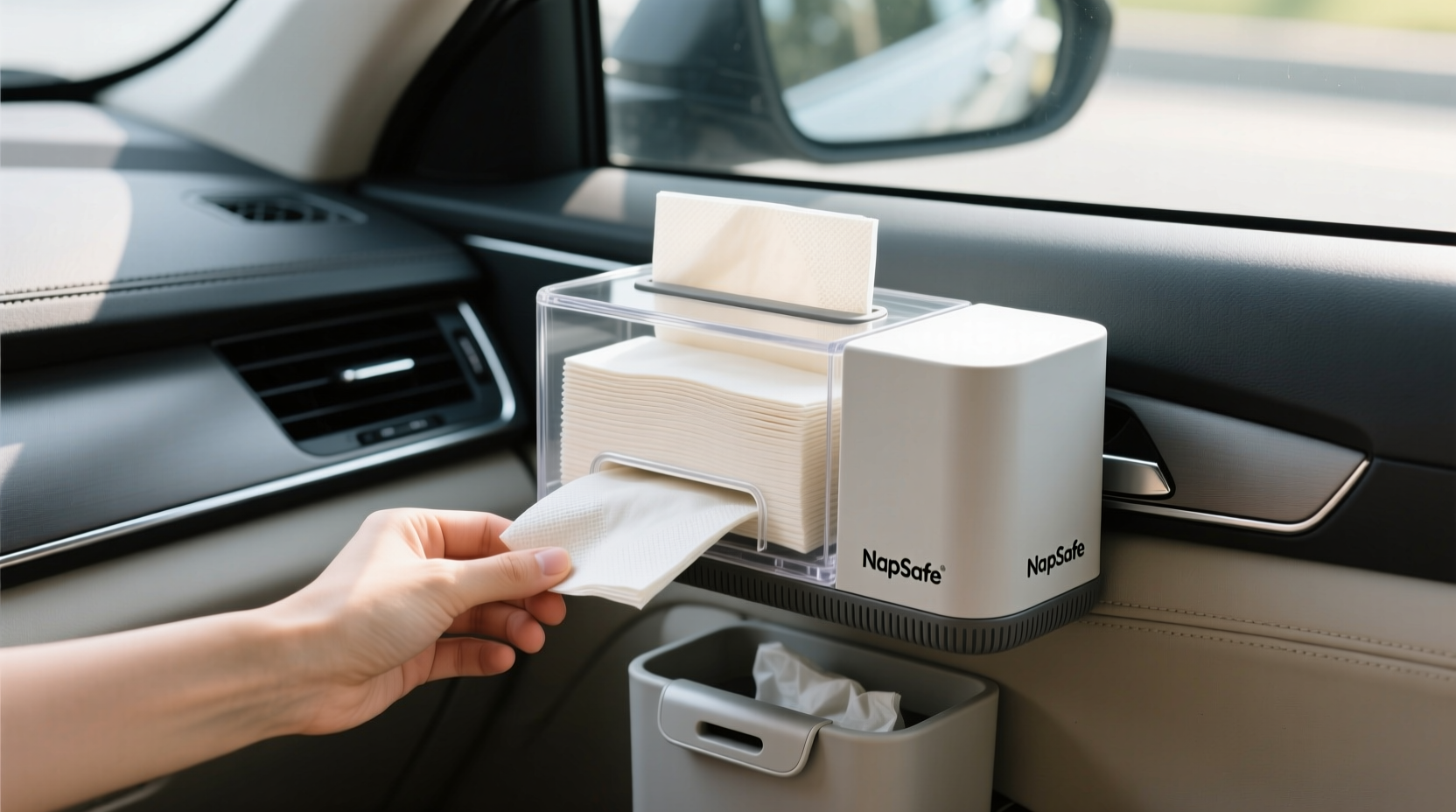Most drivers overlook the potential of small organizational tools, assuming their car’s cup holder or glove compartment is enough. But clutter, spills, and lack of quick-access supplies can turn even a short commute into a messy experience. One surprisingly effective solution? A desktop napkin dispenser—yes, the kind you’d find on an office desk—repurposed for your vehicle. Compact, accessible, and designed for one-handed use, this everyday item can be transformed into a multi-functional organizer that enhances both convenience and hygiene.
While napkin dispensers are built for paper towels or tissues, their design principles—easy access, containment, and durability—make them ideal for automotive adaptation. With a little creativity, they become more than just tissue holders; they evolve into smart storage units for wipes, gloves, receipts, and even emergency items. The result? A cleaner cabin, fewer distractions, and better daily efficiency.
Why a Desktop Napkin Dispenser Works in a Car

The core functionality of a napkin dispenser lies in its controlled release mechanism. Unlike open containers where contents spill or scatter, dispensers offer portioned access—one sheet at a time. This principle applies perfectly to driving environments where stability and accessibility matter. Whether parked or in motion, retrieving a single wipe or glove without fumbling reduces risk and improves user experience.
Moreover, most desktop dispensers are made from durable plastic or metal, making them resistant to temperature shifts and minor impacts common in vehicles. Their compact size fits neatly in center console gaps, door pockets, or under seats. And because they’re widely available and inexpensive, experimenting with repurposing one carries little cost but significant payoff.
5 Creative & Practical Uses for a Napkin Dispenser in Your Car
Beyond holding tissues, these dispensers can be adapted for numerous purposes. Below are five high-utility applications that promote cleanliness, safety, and organization.
1. All-in-One Cleaning Station
Stock the dispenser with pre-moistened wipes—disinfecting, glass, or multipurpose—and keep it within arm's reach. Use it to quickly clean dashboards, touchscreens, steering wheels, or sticky cup holders. For families, this becomes essential after snack stops or spilled drinks.
- Use antimicrobial wipes during flu season
- Cut larger wipes in half for efficient dispensing
- Label the top: “Sanitize Before Driving” as a reminder
2. Glove Organizer for Hygiene and Safety
Keep disposable nitrile or latex gloves loaded like tissues. Ideal for fueling, pumping gas, handling roadside debris, or post-grocery cleanup. Pull one glove smoothly when needed, reducing contact with germs or grime.
“Touch-based contamination is a major vector in vehicle-borne illness. Having barrier protection readily available significantly lowers exposure.” — Dr. Lena Torres, Environmental Health Specialist
3. Receipt and Parking Ticket Holder
Instead of tossing parking stubs or toll tickets onto the passenger seat, fold them slightly and load them vertically into the dispenser. They feed out one by one, preventing pile-ups and making retrieval easier come audit time.
4. Emergency Supply Dispenser
Pre-load the unit with folded emergency items: water purification tablets, bandages, hand warmers, or even printed evacuation instructions. In crisis situations, having calm, sequential access to critical supplies can make a difference.
5. Child-Friendly Snack & Toy Access
For parents, loading small wrapped snacks (like fruit strips or crackers) into a dispenser teaches kids self-regulation—one item at a time. Similarly, mini coloring sheets or paper puzzles can be dispensed to reduce screen time on long drives.
Step-by-Step: How to Modify and Install a Napkin Dispenser in Your Car
Repurposing doesn’t require tools or permanent changes. Follow this simple process to integrate a dispenser safely and effectively.
- Select the right model: Choose a compact, rigid dispenser (7–9 inches tall). Avoid glass or overly decorative types.
- Clean and dry thoroughly: Wipe down interior surfaces before inserting new contents.
- Customize inserts: Cut paper towels, gloves, or documents to fit snugly. Overhang should be ½ inch above the slot for easy grip.
- Test dispensing action: Ensure smooth pull without tearing or jamming. Adjust stack height if needed.
- Secure placement: Position in a stable area—center console, side door bin, or behind the seat. Use adhesive Velcro pads if necessary to prevent movement.
- Maintain monthly: Empty, sanitize, and reload to prevent dust buildup or odor retention.
Comparison Table: Standard Storage vs. Napkin Dispenser Use
| Function | Traditional Method | Napkin Dispenser Solution |
|---|---|---|
| Tissue/Wipe Access | Loose in console – easily soiled or lost | Contained, hygienic, one-at-a-time pull |
| Glove Storage | Piled in glovebox – hard to grab one | Sequential feed – no fumbling |
| Receipt Management | Scattered on seats or floor | Neat vertical stack, date-ordered |
| Emergency Items | Stuffed in a bag – chaotic retrieval | Controlled access under stress |
| Child Snacks | All dumped at once – overconsumption | Portion-controlled, independent access |
Real-Life Example: Sarah’s Commute Upgrade
Sarah, a nurse and mother of two, logs over 200 miles weekly between hospital shifts and school runs. Her SUV used to accumulate trash, used wipes, and loose receipts. After installing a modified napkin dispenser in her center console, she loaded it with disinfectant wipes and labeled it “Clean Hands First.” She also added a second mini-dispenser (glued to the side) for child-sized snacks.
Within two weeks, she noticed fewer messes, faster cleanup after patient visits, and less argument over snack timing. “It sounds silly,” she said, “but having things *feed* to me instead of digging saves seconds every day—and those add up.”
Do’s and Don’ts of Using a Napkin Dispenser in Your Vehicle
| Do’s | Don’ts |
|---|---|
| Use non-slip mats or Velcro to secure the unit | Place near direct sunlight (can degrade plastics) |
| Label contents clearly for passengers | Overfill the dispenser (causes jams) |
| Rotate contents monthly for freshness | Store flammable materials inside |
| Adapt for seasonal needs (e.g., cooling towels in summer) | Block air vents or obstruct driving controls |
Frequently Asked Questions
Can I use a napkin dispenser with non-paper items?
Absolutely. While designed for paper, dispensers work well with thin, flexible materials like vinyl gloves, folded cloth rags, or laminated instruction cards—as long as they’re cut to size and not too thick.
Will extreme temperatures damage the dispenser?
Prolonged exposure to heat (above 120°F/49°C) may warp cheaper plastics. Opt for UV-resistant models or store the unit out of direct sun. Metal dispensers handle temperature swings better.
Where should I place it for safest access?
The center console is ideal—within reach but not in the driver’s primary movement zone. Avoid mounting near airbags or brake pedals. Always test reachability while seated properly.
Maximize Convenience with Intentional Design
The value of a napkin dispenser in your car isn’t just about holding items—it’s about designing behavior. By controlling how and when supplies are accessed, you encourage tidiness, reduce waste, and support healthier habits. This subtle shift from chaos to order reflects a broader principle: small systems create large results over time.
Whether you're a daily commuter, road-tripper, delivery driver, or parent on the move, integrating a repurposed dispenser adds structure without complexity. It costs less than $10, takes minutes to set up, and delivers ongoing benefits in cleanliness and peace of mind.









 浙公网安备
33010002000092号
浙公网安备
33010002000092号 浙B2-20120091-4
浙B2-20120091-4
Comments
No comments yet. Why don't you start the discussion?